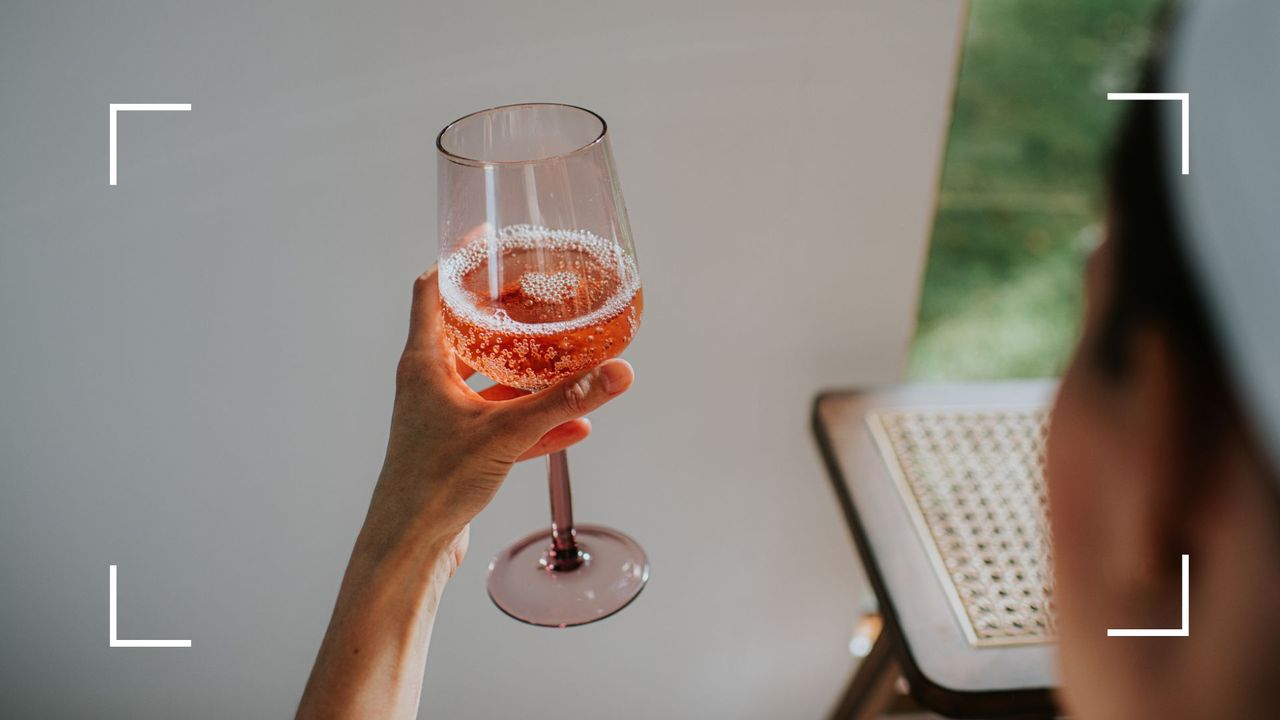I tried cutting back on alcohol to help my menopause symptoms - and these are the surprising benefits I found
There are so many benefits of cutting back on alcohol, especially for those going through menopause, as writer Samantha Priestley discovered


The benefits of cutting back on alcohol when it comes to general life are obvious, everything from a healthier bank account to clearer skin. But when it comes to menopause, ditching alcohol can really improve the experience, as writer Samantha Priestley discovered years ago when she decided to make a change.
Alcohol has been part of all my adult life - and a little while before. Drinking was a big part of my social life when I was younger and the weekends were designated for going to the pub, followed by a club later on. When I had children, I stopped going out as much and started enjoying alcohol at home. The pints of beer were a thing of the past, wild nights out gone, but I was still drinking at home.
When I started experiencing the symptoms of menopause, all that quickly changed again as extreme fatigue, dizzy spells, and urinary problems became part of my life. It was obvious to me that alcohol wasn't helping and after deciding that I couldn't face the worsening hangovers followed by days of exhaustion after anything more than two glasses of wine, I debated trying to give up alcohol for good. But I still enjoyed a single glass of wine every now and then, so I decided to learn how to cut down on alcohol instead.
To my surprise, it wasn't only the unwanted hangovers and tiredness I got rid of in the process. There were other, unexpected benefits of cutting back on alcohol in menopause.
Benefits of cutting back on alcohol during menopause
1. Cutting back on alcohol improves your mood
Like many people, I'm cranky when I'm tired. Since my menopause though, I've noticed that I'm even more tired more of the time, and I'm extra tired the day after I've been drinking. One of the biggest benefits of cutting back on alcohol for me has been an increase in day-to-day energy which, in turn, has improved my mood.
It's to be expected, says Dr Sarah Boss, a psychiatrist and addiction specialist at The Balance, as "the hormonal fluctuations during menopause can impact both your mood and general mental health, and alcohol can also influence mood and emotional regulation."

Dr Sarah Boss is a psychiatrist and psychotherapist who completed 15 years worth of training in medicine and psychotherapy in Vienna before transitioning to the role of addiction specialist at The Balance, the largest addiction treatment facility in Europe.
Having both together is a double whammy that leads to overall lower mood and general worsening mental health, agrees Dr Sarah Jenkins, a former GP and menopause specialist. "Alcohol is a depressant which works on your central nervous system by affecting your neurotransmitters. As women, our brain chemistry is already changing due to menopause, reducing estrogen and progesterone," she says.
Sign up for the woman&home newsletter
Sign up to our free daily email for the latest royal and entertainment news, interesting opinion, expert advice on styling and beauty trends, and no-nonsense guides to the health and wellness questions you want answered.
"As alcohol is essentially a poison, it affects the brain and other organs like the liver and stomach. It suppresses higher cortical brain function, slowing down cognition. This is not a good combination for a brain that's already trying to cope with menopausal hormonal changes," says Dr Jenkins, who is also the assistant medical director at Skin Excellence Clinics.

Dr Sarah Jenkins is a former surgeon and GP, a women's health expert with specialisms in menopause and pelvic health. After being diagnosed with early menopause herself, Dr Jenkins became passionate about menopause education, spreading information and awareness about the topic. This passion bled into her medical job and she currently works for a London-based skin clinic that offers treatments for vaginal and pelvic menopausal issues.
2. It can help improve your sleep
I never had any problems sleeping before menopause hit but then suddenly I was waking in the middle of the night and unable to get back to sleep. Issues with hot flushes and needing the bathroom in the night would wake me up regularly, and I also woke up randomly quite often.
I began to notice that all of this got worse when I drank alcohol and although I don't drink much these days, I still sleep much better on the nights when I don't drink at all.
On its own, menopause doesn't cause insomnia. But as Dr Boss explains, both alcohol and the hormonal changes linked to menopause interfere with how our body and brain function and the negative impact on our sleep is a knock-on effect of this. "Good sleep is often compromised during menopause due to hot flashes and night sweats, and alcohol can interfere with sleep quality, so reducing alcohol intake can assist in stabilising your sleep patterns," she says.
3. Reduces the severity of hot flushes
Like most menopausal women, I’ve found hot flushes to be difficult to deal with. There’s no warning and no apparent pattern or triggers, but what I didn't realise was that drinking can make them worse.
"Hot flushes are caused by fluctuating hormones and alcohol can make them more frequent and worse in severity," says Dr Jenkins, as alcohol raises our body temperature by about half a degree even in the hours after the last glass of wine. It's why night sweats, another common menopause symptom, are also often made worse with drinking.
Cutting down on alcohol in menopause can help to limit hot flushes and this is something I've seen for myself as I still do get hot flushes but they're definitely worse after I've had a drink or two.

4. Cutting back on alcohol during menopause can help you lose weight
Dealing with menopausal weight gain has been difficult for me. I never had an issue with my weight before menopause, but since the symptoms started, I've found I put on weight easily and losing it is twice as hard as it used to be. It can feel like a constant battle sometimes.
I know alcohol is one of the main culprits when it comes to weight gain, being one of the more calorie-dense drinks around, and since cutting back on my alcohol intake I have noticed a small decrease in my weight. I think it will take time to see better results from this, but it’s an encouraging start.
Dr Jenkins agrees - the strong correlation between weight gain, alcohol consumption and menopause is a strong one, thanks to the hormone fluctuations and metabolism changes at this stage. "Oestrogen is heavily involved in regulating glucose, the body's main energy source," she explains, so when this is in flux, the body struggles with processes such as insulting sensitivity, metabolism, and fat cell formation.
"Alcohol is also 'empty calories' as there's no nutritional value but it pours a lot of sugar into a body which is already struggling to regulate sugar due to this lack of insulin sensitivity," she says.
"Cutting back on alcohol is one way of reducing your calorie intake," she adds, but it's best not to restrict your diet too much in a bid to lose weight as a balanced diet, complete with carbohydrates, protein, fibre, vitamins, and minerals, is necessary to stay healthy and energised.
5. Cutting back on alcohol can help improve your bone health
Both my mother and my grandmother suffered from osteoporosis, so this is one of the benefits of cutting back on alcohol that's quite close to my heart. Again, I don’t yet know what kind of effect drinking alcohol - or cutting it down - has had on my bone density, but I do know it’s something I’m very mindful of.
During menopause, our bone density changes, meaning we don’t utilise calcium as well as we once did and our bones become thin and weak, says Dr Jenkins. Plus, "too much alcohol leads to macrocytic anaemia, meaning red blood cells are too big and there are not enough of them."
With bone density reaching its peak at around age 35, I've already taken steps over the last few years to ensure I'm getting in more weight-bearing exercise - like running, strength training, and power walking. This is essential, the doctor says. "Weight-bearing exercise along with taking a daily calcium and vitamin D supplement is recommended as a way to prevent osteoporosis and risk of fractures from brittle bones in later life."
6. It can help improve your heart health
As I didn’t have any heart issues before menopause that I know of, I don’t know if menopause has created any issues or if drinking alcohol has contributed to any. It's widely recognised that cases of heart disease rise with menopause though, so it perhaps shouldn't have been a surprise to learn that cutting down on drinking goes some way to protecting our heart health as we age.
“The British Heart Foundation say women have a low risk of developing coronary heart disease prior to menopause. However, post menopause this risk increases due to many factors," says Dr Jenkins. "Lower levels of oestrogen mean a reduction of heart and blood vessel protection. Our cholesterol can increase, blood pressure can become higher, and fat can accumulate in blood vessels."
And as we know, the link between alcohol and a higher risk of cardiovascular problems is a strong one. "Although some studies suggest moderate alcohol (particularly red wine) might have some heart benefits, excessive drinking raises blood pressure and can harm the heart," she says.
Managing lifestyle factors such as alcohol consumption and maintaining low cholesterol and good fitness will always be beneficial to your overall physical and mental health, says the doctor, including heart health.

The bottom line on alcohol and menopause
At the end of the day, all women experience menopause differently so the impact of alcohol on symptoms and long-term health may be slightly different, depending on a whole range of other factors - from other pre-existing health conditions to lifestyle habits.
Dr Jenkins points out that staying within a healthy drinking bracket at any time of life is beneficial, regardless of your age, but once the symptoms of perimenopause begin to appear, it’s even more important.
"Genuine menopause symptoms can be masked with alcohol consumption and the side effects of drinking too much regularly," she says. "If you are drinking more than 14 units of alcohol a week (a bottle of wine has approximately nine units) then you are drinking more than the recommended weekly amount."
If you think you may have a drinking problem or any issue with alcohol, consult your doctor for advice.
What's the best alcohol to drink during menopause?
Given the above, it shouldn't be a surprise to learn that there's no 'best' alcohol to drink during menopause. Rather than choosing a specific alcohol to drink, Dr Jenkins says, "It's the same old message of everything in moderation. Be aware of the signs in your mind and body and listen to them."
For me personally, red wine is the one alcoholic drink I’ll continue to drink in moderation during menopause. I’ve found beer makes me bloated these days and spirits give me a headache and make me feel exhausted the next day. A small glass of red wine with dinner a couple of nights a week is all I really want now, and I feel much healthier for cutting out other alcoholic drinks.
"Red wine is often cited for its potential heart-healthy benefits due to its antioxidant resveratrol,” adds Dr Boss. “However, these benefits must be weighed against potential risks and consumed in moderation."
For those particularly concerned about the impact of menopause on their weight, an easy option is low-calorie alternatives, like low-calorie beer and spirits with low-calorie mixers, she adds. Or, try one of the best alternatives to alcohol for an entirely booze-free drink.
Can you drink alcohol on HRT?
If you're looking to continue drinking in menopause and are currently on hormone replacement therapy (HRT), it's important to talk to your doctor. "Drinking with HRT is not a total contraindication but you must always consider your individual risk of health issues. For example, if you have a cardiac risk, high blood pressure, are overweight, have a risk of cancer, strong, and so on. It's best to have an open and honest discussion with your HRT physician about your real alcohol consumption so they can risk assess you properly and monitor you accordingly," says Dr Jenkins.
Personally, I'm only on an HRT vaginal cream so it's not something I've had to consider. But for women who are on HRT, this is an important question. As the doctor urges, we all need to be honest about alcohol - especially when going through menopause - so we can make the best decisions for our own health.
Samantha is a freelance writer from Yorkshire, writing about health and wellbeing for Woman & Home, Reader's Digest, Giddy, and Good Housekeeping. For the past 15 years, she's combined her personal experiences with reporting, to write about menopause, fitness, sleep, and healthy eating. She also writes about travel and food and drink for The Independent, The Good food Guide, Lonely Planet, Frommer's, and more.
-
 Sienna Miller's best hair and makeup moments from across the years
Sienna Miller's best hair and makeup moments from across the yearsWe revisit some of her top beauty looks from the archives...
By Lucy Abbersteen Published
-
 Katie Holmes broke an unspoken fashion rule in tights and mules - her shoes are available for less than £100 on Amazon
Katie Holmes broke an unspoken fashion rule in tights and mules - her shoes are available for less than £100 on AmazonThe statement gold kitten heels are a surprisingly versatile spring staple
By Charlie Elizabeth Culverhouse Published